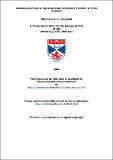Files in this item
Normalisation & equivalence in proof theory & type theory
Item metadata
| dc.contributor.advisor | Dyckhoff, Roy | |
| dc.contributor.advisor | Kesner, Delia | |
| dc.contributor.author | Lengrand, Stéphane J. E. | |
| dc.coverage.spatial | 378 | en |
| dc.date.accessioned | 2007-04-20T15:04:31Z | |
| dc.date.available | 2007-04-20T15:04:31Z | |
| dc.date.issued | 2006-12-08 | |
| dc.identifier | uk.bl.ethos.551994 | |
| dc.identifier.uri | https://hdl.handle.net/10023/319 | |
| dc.description.abstract | At the heart of the connections between Proof Theory and Type Theory, the Curry-Howard correspondence provides proof-terms with computational features and equational theories, i.e. notions of normalisation and equivalence. This dissertation contributes to extend its framework in the directions of proof-theoretic formalisms (such as sequent calculus) that are appealing for logical purposes like proof-search, powerful systems beyond propositional logic such as type theories, and classical (rather than intuitionistic) reasoning. Part I is entitled Proof-terms for Intuitionistic Implicational Logic. Its contributions use rewriting techniques on proof-terms for natural deduction (Lambda-calculus) and sequent calculus, and investigate normalisation and cut-elimination, with call-by-name and call-by-value semantics. In particular, it introduces proof-term calculi for multiplicative natural deduction and for the depth-bounded sequent calculus G4. The former gives rise to the calculus Lambdalxr with explicit substitutions, weakenings and contractions that refines the Lambda-calculus and Beta-reduction, and preserves strong normalisation with a full notion of composition of substitutions. The latter gives a new insight to cut-elimination in G4. Part II, entitled Type Theory in Sequent Calculus develops a theory of Pure Type Sequent Calculi (PTSC), which are sequent calculi that are equivalent (with respect to provability and normalisation) to Pure Type Systems but better suited for proof-search, in connection with proof-assistant tactics and proof-term enumeration algorithms. Part III, entitled Towards Classical Logic, presents some approaches to classical type theory. In particular it develops a sequent calculus for a classical version of System F_omega. Beyond such a type theory, the notion of equivalence of classical proofs becomes crucial and, with such a notion based on parallel rewriting in the Calculus of Structures, we compute canonical representatives of equivalent proofs. | en |
| dc.format.extent | 2673747 bytes | |
| dc.format.mimetype | application/pdf | |
| dc.language.iso | en | en |
| dc.publisher | University of St Andrews | |
| dc.subject | Logic | en |
| dc.subject | Proof theory | en |
| dc.subject | Type theory | en |
| dc.subject | Lambda-calculus | en |
| dc.subject | Rewriting | en |
| dc.subject.lcc | QA9.54L4 | |
| dc.subject.lcsh | Proof theory | en |
| dc.subject.lcsh | Type theory | en |
| dc.subject.lcsh | Curry-Howard isomorphism | en |
| dc.subject.lcsh | Lambda calculus | en |
| dc.title | Normalisation & equivalence in proof theory & type theory | en |
| dc.title.alternative | Normalisation & equivalence en théorie de la démonstration & théorie des types | en |
| dc.type | Thesis | en |
| dc.type.qualificationlevel | Doctoral | en |
| dc.type.qualificationname | PhD Doctor of Philosophy | en |
| dc.publisher.institution | The University of St Andrews | en |
| dc.publisher.department | Université Paris 7 - Denis Diderot, France | en |
This item appears in the following Collection(s)
Items in the St Andrews Research Repository are protected by copyright, with all rights reserved, unless otherwise indicated.

